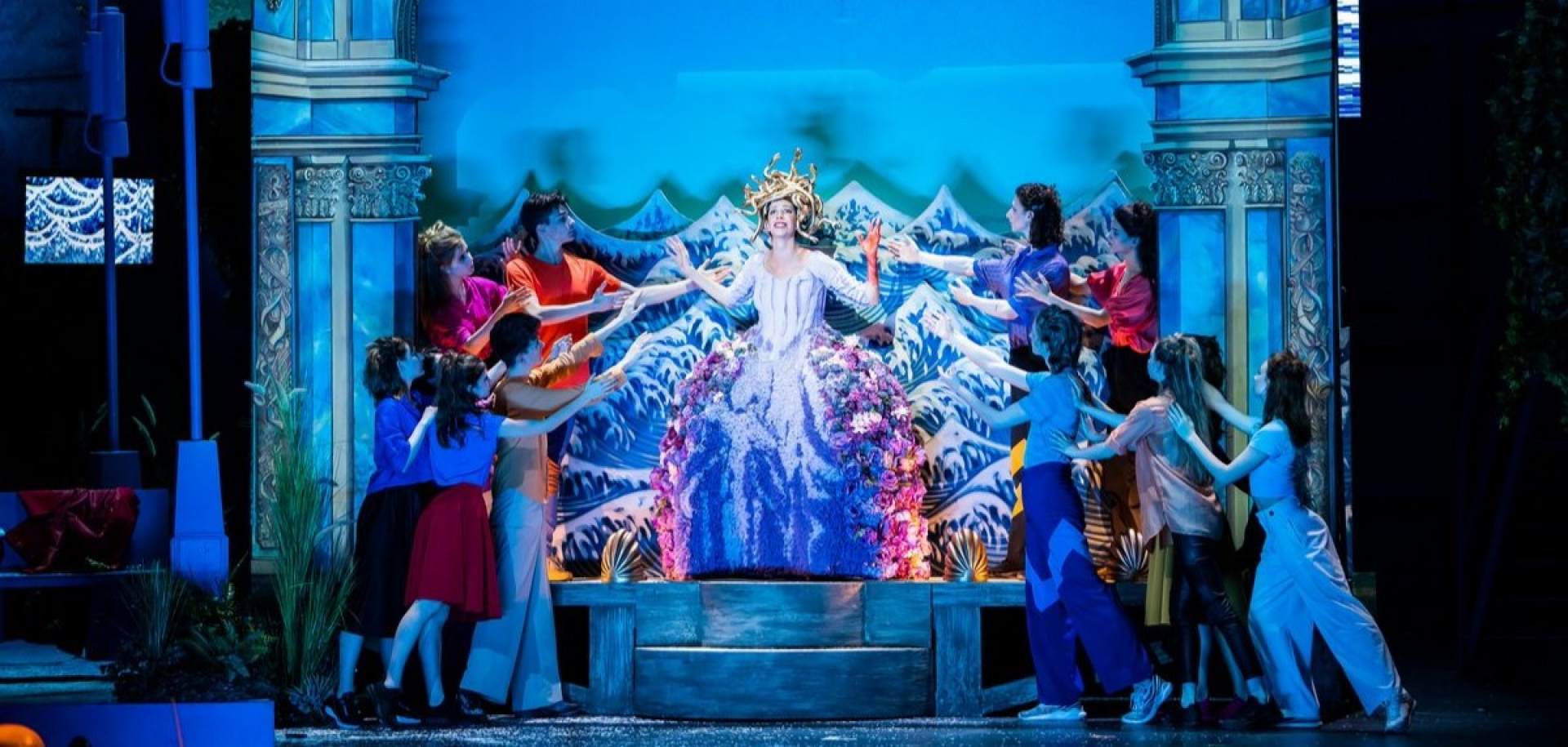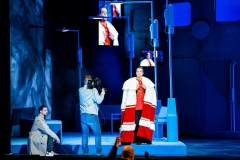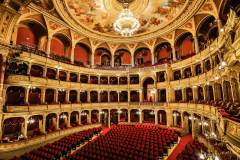Idomeneo
Mo | Tu | We | Th | Fr | Sa | Su |
Idomeneo - Wolfgang Amadeus Mozart
Opera seria in three acts, two parts, in Italian, with Hungarian, English, and Italian subtitles
Performance length: 2 hours 45 minutes, with 1 intermission.
The Trojan War was such an important historical event that it became one of the main motives of the past 2800 years of European cultural history; its episodes and characters inspired thousands of artists. Mozart’s Idomeneo, re di Creta tells the story of the tired king returning from the Trojan War and the people of Crete as they are life threateningly exposed to the uncontrollable forces of nature. The piece was only played once before in the OPERA, in 1979. About a quarter century had to pass before it found its way back to the Budapest Opera House’s stage, this time directed by András Almási-Tóth, who emphasizes the fight between nature and humanity in a modern context, in which a metropolis is flooded by the sea and nature devours urban life and the human space. Unless the god of sea forgives them…
Synopsis
Act 1
Island of Crete, shortly after the Trojan War. Ilia, daughter of the defeated Trojan King Priam, has been taken to Crete after the war. She loves Prince Idamante, son of the Cretan King Idomeneo, but hesitates to acknowledge her love. Idamante frees the Trojan prisoners in a gesture of good will. He tells Ilia, who is rejecting his love, that it is not his fault that their fathers were enemies. Trojans and Cretans together welcome the return of peace, but Electra, daughter of the Greek King Agamemnon, is jealous of Ilia and does not approve of Idamante's clemency toward the enemy prisoners. Arbace, the king's confidant, brings news that Idomeneo has been lost at sea while returning to Crete from Troy. Electra, fearing that Ilia, a Trojan, will soon become Queen of Crete, feels the furies of the underworld rise up in her heart (aria: "Tutte nel cor vi sento, furie del crudo averno" – "I feel you all in my heart, furies of the cruel underworld").
Idomeneo is saved by Neptune (god of the sea) and is washed up on a Cretan beach. There he recalls the vow he made to Neptune: to sacrifice, if he should arrive safely on land, the first living creature he should meet. Idamante approaches him, but because the two have not seen each other for a long time, recognition is difficult. When Idomeneo finally realizes the youth that he must sacrifice for the sake of his vow is his own child, he orders Idamante never to seek him out again. Grief-stricken by his father's rejection, Idamante runs off. Cretan troops disembarking from Idomeneo's ship are met by their wives, and all praise Neptune.
Act 2
At the king's palace, Idomeneo seeks counsel from Arbace, who says another victim could be sacrificed if Idamante were sent into exile. Idomeneo orders his son to escort Electra to her home, Argos. Idomeneo's kind words to Ilia move her to declare that since she has lost everything, he will be her father and Crete her country. As she leaves, Idomeneo realizes that sending Idamante into exile has cost Ilia her happiness as well as his own. Electra welcomes the idea of going to Argos with Idamante.
At the port of Sidon (a fictional city of Crete), Idomeneo bids his son farewell and urges him to learn the art of ruling while he is away. Before the ship can sail, however, a storm breaks out, and a sea serpent appears. Recognizing it as a messenger from Neptune, the king offers himself as atonement for having violated his vow to the god.
Act 3
In the royal garden, Ilia asks the breezes to carry her love to Idamante, who appears, explaining that he must go to fight the serpent. When he says he would rather die than suffer the torments of his rejected love, Ilia confesses her love. They are surprised by Electra and Idomeneo. When Idamante asks his father why he sends him away, Idomeneo can only reply that the youth must leave. Ilia asks for consolation from Electra, who is preoccupied with revenge. Arbace comes with news that the people, led by the High Priest of Neptune, are clamoring for Idomeneo. The High Priest tells the king of the destruction caused by Neptune's monster, urging Idomeneo to reveal the name of the person whose sacrifice is demanded by the god. When the king confesses that his own son is the victim, the populace is horrified.
Outside the temple, the king and High Priest join Neptune's priests in prayer that the god may be appeased. Arbace brings news that Idamante has killed the monster. As Idomeneo fears new reprisals from Neptune, Idamante enters in sacrificial robes, saying he understands his father's torment and is ready to die. After an agonizing farewell, Idomeneo is about to sacrifice his son when Ilia intervenes, offering her own life instead. The Voice of Neptune is heard. Idomeneo must yield the throne to Ilia and Idamante. Everyone is relieved except Electra, who longs for her own death. Idomeneo presents Idamante and his bride as the new rulers. The people call upon the god of love and marriage to bless the royal pair and bring peace.
Program and cast
Conductor: Ádám Cser, Sámuel Csaba Tóth
Ilia: Zita Szemere
Idomeneo: Szabolcs Brickner
Idamante: Artúr Szeleczki
Elettra: Laura Topolánszky
Arbace: Ninh Duc Hoang Long
The Voice: N.N.
Featuring the Hungarian State Opera Orchestra and Chorus, as well as students of the Hungarian Dance University
Composer: Wolfgang Amadeus Mozart
Librettist: Giambattista Varesco
Director: András Almási-Tóth
Set designer: Sebastian Hannak
Costume designer: Richárd Márton
Choreographer: Noémi Kulcsár
Lighting designer: Tamás Pillinger
Video designer: Zsombor Czeglédi
Hungarian text based on Mária Anna Kovács's translation by András Almási-Tóth
Chorus director: Gábor Csiki
Hungarian State Opera
STANDING ROOM TICKETS - INFORMATION IN CASE OF A FULL HOUSE!
If all the seats are sold out for the selected time, but you still want to see the production on that day, 84 of the extremely affordable standing seats will be sold at the theatre, 2 hours before the start of the performance, with which you can visit the gallery on the 3rd floor. Tickets can be purchased at the ticket office of the Budapest Opera House. We would like to draw your attention to the fact that the stage can only be seen to a limited extent from the standing places and the side seats, but at the same time, following the performance is also supported by television broadcasting on the spot.
The Opera House is not only one of the most significant art relic of Budapest, but the symbol of the Hungarian operatic tradition of more than three hundred years as well. The long-awaited moment in Hungarian opera life arrived on September 27, 1884, when, in the presence of Franz Joseph I. the Opera House was opened amid great pomp and ceremony. The event, however, erupted into a small scandal - the curious crowd broke into the entrance hall and overran the security guards in order to catch a glimpse of the splendid Palace on Sugar út. Designed by Mikós Ybl, a major figure of 19th century Hungarian architecture, the construction lived up to the highest expectations. Ornamentation included paintings and sculptures by leading figures of Hungarian art of the time: Károly Lotz, Bertalan Székely, Mór Than and Alajos Stróbl. The great bronze chandelier from Mainz and the stage machinery moda by the Asphaleia company of Vienna were both considered as cutting-edge technology at that time.
Many important artists were guests here including Gustav Mahler, the composer who was director in Budapest from 1887 to 1891. He founded the international prestige of the institution, performing Wagner operas as well as Magcagni’ Cavalleria Rusticana. The Hungarian State Opera has always maintained high professional standards, inviting international stars like Renée Fleming, Cecilia Bartoli, Monserrat Caballé, Placido Domingo, Luciano Pavarotti, José Cura, Thomas Hampson and Juan Diego Flórez to perform on its stage. The Hungarian cast include outstanding and renowed artists like Éva Marton, Ilona Tokody, Andrea Rost, Dénes Gulyás, Attila Fekete and Gábor Bretz.

 EN
EN DE
DE IT
IT FR
FR ES
ES RU
RU JP
JP RO
RO
 Seating plan
Seating plan 




